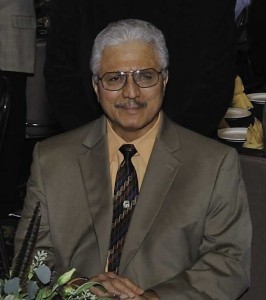
Meanwhile, IATSE on behalf of its 15 Hollywood locals that represent below-the-line crew members on movie and television productions announced on April 13 that it had reached a preliminary agreement with AMPTP for a new three-year contract after only 4 ½ weeks of talks – including a four-week recess to review offers.
Given the IA’s ability to bag a new three-year pact in relatively short order, what’s holding up a resumption of the talks between the Teamsters and AMPTP? And when are the parties expected to return to the table?
The good news is the talks are likely to resume fairly soon, probably within two or three weeks. And there are no big looming impediments to reaching a deal on the horizon. The stretched out adjournment is more a matter of negotiating tactics than of intractable issues separating the sides.
“We’ll probably go back to the negotiating table in two or three weeks,” Leo Reed, Local 399 secretary-treasurer and the union’s chief negotiator, told Below the Line. “Remember, the contract doesn’t run out until July 31 so there still is lots of time.”
Reed said his negotiating strategy for the union was to draw out the talks with AMPTP. “If I go earlier they play with me and stall around,” he declared. “So I prefer to go a little late and get straight to business.”
He said there was “no big rift” between the Teamsters and AMPTP that had led to the long absence from the negotiating table. The chief negotiator for Local 399 explained that he and his team have been spending the time reviewing workplace-related issues that were on the table. “We’re looking at some of the non-economic issues,” he noted.
Up until now, Reed had not shared his timetable. Even AMPTP has been kept in the dark, according to sources. AMPTP spokesperson Jesse Hiestand said the organization had “no comment” on when talks with the Teamsters might resume. He indicated that next week, at least, was out of the question because on Monday contract negotiations between the studios and the non-Los Angeles, non-Western region IA guilds are scheduled to start.
In 2010, the Teamsters and IATSE, which have had their spats in the past, reached a “mutual assistance pact” to increase their bargaining heft with the studios by aligning the ending date of their contracts for the first time in order to hold parallel negotiations. Instead of negotiating a three-year deal, the Teamsters went for a two-year extension, so both contracts are set to expire on July 31. The new contracts will run from August 1 to July 31, 2015.
 Much of the heavy lifting in the talks has already been done by IATSE, which negotiated a 2 percent annual wage increase compounded over the next three years. More significantly, a way was found to plug an estimated $400 million hole in the unions’ pension plans and the Motion Picture Industry Health Plan over the next three years. That is the likely template for what the Teamsters are also going to obtain.
Much of the heavy lifting in the talks has already been done by IATSE, which negotiated a 2 percent annual wage increase compounded over the next three years. More significantly, a way was found to plug an estimated $400 million hole in the unions’ pension plans and the Motion Picture Industry Health Plan over the next three years. That is the likely template for what the Teamsters are also going to obtain.
The studios stepped up and agreed to a $1-an-hour increase in the health plan contribution rate, a 20 percent increase over the current rate of $5 per hour. As an offset, members with dependents will pay modest premiums for medical care for the first time.
“Matt did a very good job, and we’re both on the same wavelength,” said Reed referring to Matthew Loeb, the president of IATSE who spearheaded the negotiations for the 15 local guilds representing specialties like production designers and art directors, cinematographers and their camera crew, costume designers and lighting experts.
Reed said he and his members will be closely monitoring the upcoming ratification vote by the 20,000 IA members on their contract, which could come before the Teamsters reach an agreement. The final language on the IATSE pact is still being hammered out. But the memorandum of agreement on the final contract should be sent to members in a few weeks, followed by a ballot.
The Motion Picture and Theatrical Trade Teamsters, as Local 399 is formally called, represents nearly 3,000 members. Most of them are drivers of vehicles of all sorts that are used during a shoot – from basic transport to food trucks and specialized vehicles like camera cars. The union’s ranks also includes animal trainers and wranglers.
In recent years, other entertainment-industry employees have organized and joined the Teamsters in order to obtain health and retirement benefits and to be represented by a union that has demonstrated considerable negotiating clout. It’s ultimate backup is its parent union, the powerful International Brotherhood of Teamsters. Employees that are members of Local 399 include secretaries and other clerical employees as well as location managers and casting directors. The casting directors, however, bargain separately.
In contract talks with AMPTP, the Teamsters also negotiate in tandem with the Basic Crafts, below-the-line unions that are not part of IATSE. Reed chairs their joint negotiating committee. The five Basic Crafts Unions are International Brotherhood of Electrical Workers, Local No. 40, Plumbers, Local No. 78, Teamsters, Local No. 399, Studio Utility Employees, Local No. 724, and Operative Plasterers and Cement Masons, Local No. 755. Each of these unions individually submits a contract to its members for ratification.
Despite the strategy of delaying a resumption of contract talks for the tactical reasons enunciated by Reed, this negotiation is unlikely to lead to a repeat of the brinkmanship that characterized the last round in 2010. Then the issue was more divisive – wages. The Teamsters held out until almost the July 31 contract expiration and threatened to strike over the wage issue – they wanted a 3 percent annual wage increase, instead of the 2 percent offered by the studios. In the end the Teamsters capitulated.
Reed’s pragmatism can be gleaned from his communication to Local 399 members after the negotiations ended. He urged them to vote yes on the producers’ memorandum of agreement, calling it “a great offer” though it fell short. “I wanted 3 percent,” he said. And as the negotiating deadline neared, “we told them that we would not recommend their offer, and that we were going to strike them.” But finally, “we decided not to let our egos get in our way, and recommended the contract,” he said. “It is easy to negotiate a strike. It is tough to negotiate a contract.”
Over 97% of Local 399 members voted to approve the pact.





